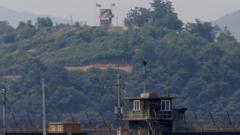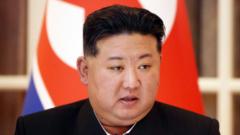In a recent incident, South Korea confirmed it fired warning shots at North Korean soldiers who briefly crossed the heavily fortified border. The move has heightened tensions as North Korea's state media labeled the shots a "deliberate provocation," warning of escalating dangers.
South Korea Responds with Warning Shots as North Korean Troops Breach Border

South Korea Responds with Warning Shots as North Korean Troops Breach Border
Tensions escalate as North Korea accuses South Korea of provocation following military incursion.
South Korea's Joint Chiefs of Staff reported that North Korean troops crossed the military demarcation line at around 15:00 local time on Tuesday. This incident comes amid increasing military posturing from both sides and ongoing efforts by North Korea to secure its borders. The event coincides with newly elected South Korean President Lee Jae Myung's visit to Tokyo and Washington, prompting further speculation on future inter-Korean relations.
The DMZ remains a contentious zone, often becoming the focal point for military interactions. North Korean Army Lieutenant General Ko Jong Chol condemned South Korea’s use of military force and described the warning shots as a dangerous act that could escalate tensions to uncontrollable levels. Despite attempts for dialogue from President Lee, prospects for reconciliation appear dim as Pyongyang continues to reject overtures from Seoul, particularly following the unfavorable outcome of recent peace initiatives.
The two Koreas remain in a state of armistice since the Korean War ended in 1953, lacking a formal peace treaty and continuing to navigate a complex relationship marked by periods of confrontation and fragile diplomacy. The firing of warning shots raises concerns over the potential for miscalculation and conflict within the strategically significant DMZ.
The DMZ remains a contentious zone, often becoming the focal point for military interactions. North Korean Army Lieutenant General Ko Jong Chol condemned South Korea’s use of military force and described the warning shots as a dangerous act that could escalate tensions to uncontrollable levels. Despite attempts for dialogue from President Lee, prospects for reconciliation appear dim as Pyongyang continues to reject overtures from Seoul, particularly following the unfavorable outcome of recent peace initiatives.
The two Koreas remain in a state of armistice since the Korean War ended in 1953, lacking a formal peace treaty and continuing to navigate a complex relationship marked by periods of confrontation and fragile diplomacy. The firing of warning shots raises concerns over the potential for miscalculation and conflict within the strategically significant DMZ.















